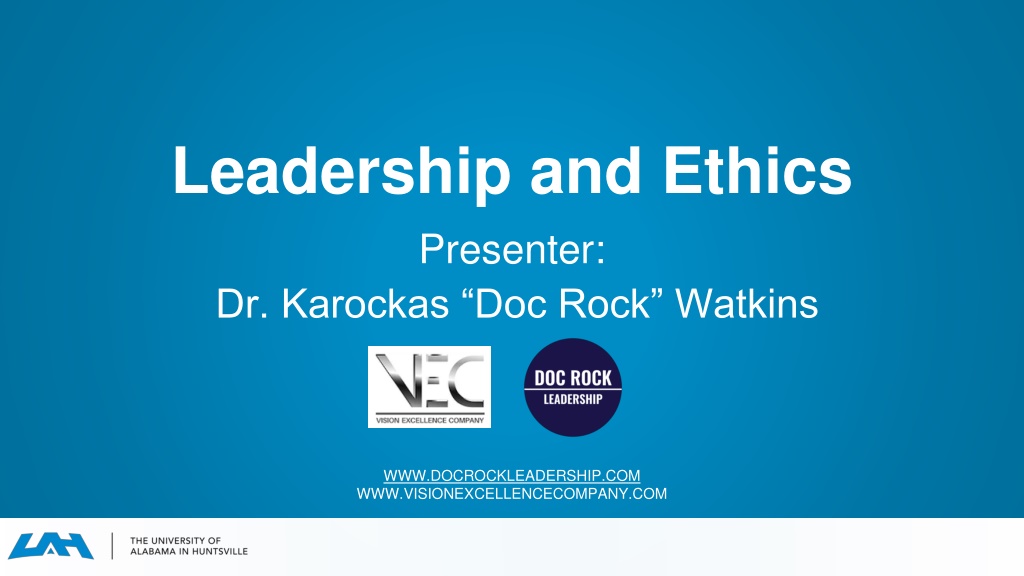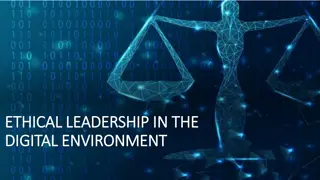Exploring the Nexus of Leadership and Ethics in Business
Leadership and ethics are intertwined elements crucial for organizational success. Effective leadership requires a strong ethical foundation, incorporating integrity, fairness, and accountability. This article delves into the key characteristics of effective leaders, emphasizing visionary thinking, communication skills, integrity, empathy, decisiveness, adaptability, inspiration, motivation, and accountability. Understanding and embodying these traits can facilitate a positive organizational culture and sustainable long-term success.
Download Presentation

Please find below an Image/Link to download the presentation.
The content on the website is provided AS IS for your information and personal use only. It may not be sold, licensed, or shared on other websites without obtaining consent from the author. Download presentation by click this link. If you encounter any issues during the download, it is possible that the publisher has removed the file from their server.
E N D
Presentation Transcript
Leadership and Ethics Presenter: Dr. Karockas Doc Rock Watkins WWW.DOCROCKLEADERSHIP.COM WWW.VISIONEXCELLENCECOMPANY.COM
Introduction Leadership and ethics are intrinsically linked, as effective leadership is founded on a strong ethical framework. Leaders guide their organizations not only through strategic vision and decision-making but also by embodying principles of integrity, fairness, and accountability. Ethical leadership fosters trust and cultivates a positive organizational culture, and ensures long-term success by prioritizing the well-being of individuals, company and the community.
Understanding Leadership What is Leadership? Leadership is the ability to guide, inspire, and influence a group of people to achieve a common goal. It involves setting a vision, making strategic decisions, and motivating others to work collaboratively towards the desired outcome. Effective leadership encompasses a range of skills, including communication, empathy, integrity, and adaptability. It also requires the capacity to manage conflicts, foster a positive organizational culture, and drive change in dynamic environments. Leadership can be exhibited at all levels of an organization, not just by those in formal positions of authority. LEADERSHIP: The capacity to influence others through inspiration, motivated by a passion, generated by a vision, produced by a conviction, ignited by a purpose.
Key Characteristics of Effective Leaders Effective leaders often share several key characteristics that enable them toinspire, guide, and support their teams successfully. Here are some of these essential traits: Visionary Thinking: Effective leaders have a clear vision for the future and can articulate this vision in a way that motivates and inspires their team. Communication Skills: They are excellent communicators, able to convey ideas clearly and persuasively, and they also listen actively to others. Integrity: Honesty and ethical behavior are central to their leadership. They build trust by being transparent and fair. Empathy: Understanding and addressing the needs, concerns, and emotions of their team members is crucial. Empathetic leaders create strong, supportive relationships.
Key Characteristics of Effective Leaders Decisiveness: Effective leaders are capable of making firm decisions, even under pressure, and take responsibility for the outcomes. Adaptability: They can adjust their strategies and approaches in response to changing circumstances and new information. Inspiration and Motivation: They inspire and motivate others to achieve their best, often by setting a good example and recognizing individual contributions. Accountability: They hold themselves and others accountable for meeting goals and standards, fostering a culture of responsibility.
Key Characteristics of Effective Leaders Strategic Thinking: Effective leaders think strategically, anticipating future challenges and opportunities, and planning accordingly. Emotional Intelligence: They possess high emotional intelligence, enabling them to manage their own emotions and navigate social complexities effectively. Delegation: They trust their team members and delegate tasks appropriately, empowering others and fostering professional growth. Resilience: Effective leaders are resilient, able to bounce back from setbacks and maintain a positive attitude.
Leadership Styles Leadership styles refer to the approaches and methods leaders use to guide, motivate, and manage their teams. Different situations and team dynamics often call for different leadership styles. Here are some of the most commonly recognized leadership styles: Autocratic Leadership: Description: The leader makes decisions unilaterally, with little to no input from team members. Strengths: Quick decision-making, clear direction, and strong control. Weaknesses: Can lead to low morale and lack of creativity due to limited team involvement. Democratic (Participative) Leadership: Description: The leader involves team members in the decision-making process, valuing their input and feedback. Strengths: Increased team engagement, higher morale, and better ideas from diverse input. Weaknesses: Decision-making can be slower, and it may be challenging in situations requiring quick actions.
Leadership Styles Transformational Leadership: Description: The leader inspires and motivates team members to exceed their own expectations and embrace change. Strengths: High motivation, innovation, and strong team loyalty. Weaknesses: Can be exhausting for the leader, and may overlook practical details. Transactional Leadership: Description: The leader focuses on routine transactions, rewarding performance, and disciplining failures. Strengths: Clear structure, efficient task management, and straightforward performance evaluation. Weaknesses: May stifle creativity and not address long-term growth and development needs.
Leadership Styles Laissez-Faire Leadership: Description: The leader takes a hands-off approach, allowing team members to self-manage and make decisions. Strengths: High autonomy, fostering creativity and innovation. Weaknesses: Can lead to lack of direction, inconsistent performance, and potential disorganization. Servant Leadership: Description: The leader prioritizes the needs of the team, focusing on serving and supporting them. Strengths: Strong team loyalty, high morale, and personal growth for team members. Weaknesses: Can be perceived as weak or indecisive, and may not be effective in all situations.
Leadership Styles Charismatic Leadership: Description: The leader uses their charm and persuasiveness to inspire and motivate the team. Strengths: High energy, strong personal influence, and motivation. Weaknesses: Over-reliance on the leader s presence, and potential for ego-driven decisions. Situational Leadership: Description: The leader adapts their style to the needs of the situation and the team s development level. Strengths: Flexible and responsive, tailored to team dynamics and specific challenges. Weaknesses: Requires high awareness and adaptability from the leader.
Leadership Styles Bureaucratic Leadership: Description: The leader follows strict procedures and policies, emphasizing rules and formal structures. Strengths: Clear expectations, consistency, and safety in highly regulated environments. Weaknesses: Can be inflexible, stifling creativity and innovation. Each leadership style has its own advantages and drawbacks, and effective leaders often blend elements from different styles to suit the specific needs of their team and organizational context.
The Role of Ethics in Leadership Defining Ethics: Ethics is the branch of philosophy that deals with questions about what is morally right and wrong, good and bad, fair and unfair. It involves the systematic study of principles and values that guide human conduct and seeks to determine what individuals and societies ought to do. Here are some key aspects of ethics: Moral Principles: Ethics involves establishing and adhering to fundamental principles that dictate what is considered right and wrong. These principles often include honesty, integrity, fairness, respect, and justice. Values: Ethics is closely related to values, which are the beliefs and ideals that individuals and societies hold dear. These values influence behavior and decision- making processes. Norms and Standards: Ethics involves creating norms and standards for behavior that are accepted by a group or society. These norms help maintain order and fairness in social interactions.
The Role of Ethics in Leadership Rights and Duties: Ethics examines the rights individuals possess and the corresponding duties they owe to others. It addresses questions about individual freedoms, responsibilities, and the balance between personal and collective good. Virtue and Character: Ethics often emphasizes the importance of developing virtuous character traits such as kindness, courage, and humility, which contribute to moral behavior. Consequences: Ethical theories frequently consider the consequences of actions, evaluating whether the outcomes promote overall well-being and minimize harm. Justice and Fairness: Ethics explores issues of justice and fairness, ensuring that individuals are treated equitably, and that resources and opportunities are distributed fairly. Ethics is applied in various fields, including business, medicine, law, and personal relationships, guiding individuals and organizations in making morally sound decisions and fostering a just and harmonious society.
What are ethics and why are they important in leadership? Ethics are critically important in leadership for several reasons: Trust and Credibility: Ethical leaders build trust with their followers by being honest and transparent. Trust is essential for effective leadership as it fosters loyalty and cooperation. Decision-Making: Ethical principles guide leaders in making decisions that are just and fair. This helps in resolving conflicts, allocating resources, and setting policies that reflect the values of the organization and society. Reputation: Leaders who consistently demonstrate ethical behavior enhance their own reputation and that of their organization. A positive reputation attracts talent, customers, and investors.
What are ethics and why are they important in leadership? Organizational Culture: Ethical leadership sets the tone for the entire organization, promoting a culture of integrity, accountability, and respect. This culture impacts employee morale and productivity. Long-Term Success: Ethical leaders focus on sustainable practices and long-term benefits rather than short-term gains. This perspective helps ensure the organization s enduring success and societal impact. Legal and Regulatory Compliance: Ethical leaders are more likely to comply with laws and regulations, reducing the risk of legal issues and promoting a safe and fair working environment.
What are ethics and why are they important in leadership? Social Responsibility: Ethical leadership encompasses a commitment to social responsibility, ensuring that the organization contributes positively to the community and environment. Employee Satisfaction and Retention: Employees are more likely to feel valued and stay with an organization that prioritizes ethical behavior. This reduces turnover and fosters a more committed workforce. In summary, ethics in leadership is about integrating moral principles into decision-making and behavior. It is essential for building trust, maintaining a positive reputation, fostering a strong organizational culture, ensuring long-term success, and fulfilling social responsibilities. Ethical leadership creates a foundation for sustainable and responsible business practices that benefit individuals, organizations, and society as a whole.
Core Ethical Principles Integrity Accountability Fairness Respect Transparency























